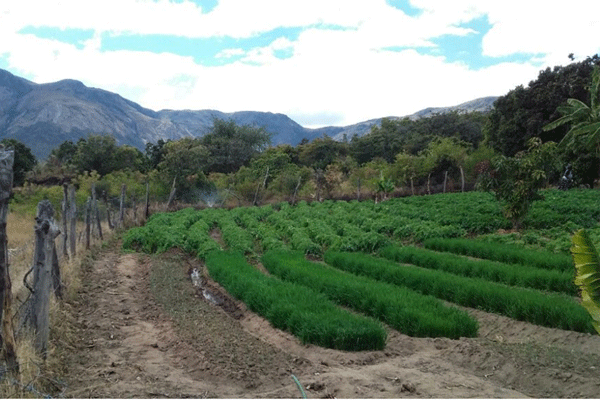Source: Communities repel effects of climate change through conservation agriculture – NewsDay Zimbabwe
BY TONDERAYI MATONHO
Villagers living along ‘Bhinya Road’, a dusty and winding long road in Nyanga South, lined up by four villages, Mambemba, Bonde, Nyatondo and Sedze, have mastered the art of conservation agriculture and use of harvested water from the Nyangani Mountain Range.After decades of living on the leeward side of the mountain range, characterised by erratic rainfall and incessant droughts, the villagers in the four villages now enjoy the fruits of organic farming and harvested water from the mountain range now flowing through homesteads and schools as tap water.
With these determined efforts, climate change impacts are being repulsed through use of organic manure, compost and intercropping and to nurture their crops.
The tap water being used to irrigate homestead gardens and open fields is harvested from the mountain range, captured from natural streams and pools on the range and stored in weirs, small dams and reservoirs also built high on the mountain slopes and flowing by force of gradient.
In a recent interview, one of the villagers, Diana Sedze (58), said organic farming and the water harvesting technique had transformed lives against climate change impacts.
“Soils, water, forests and woodlands need to be used with care and foresight if their fertility and texture is to be maintained,” said Sedze, a trained farmer in her own right.
“This has helped them to respond to climate change impacts such as endless droughts, heatwaves and veldfires”, she said.
Experts note that understanding future changes in the seasonal cycle of precipitation is crucial in establishing appropriate strategies, including maintaining soil fertility and investing in irrigation equipment at their homesteads and open fields.
“As a result, fertilizer supply in Zimbabwe has been driven by government policy buttressed by finance and infrastructure, while the demand has primarily been a function of the farmers’ capacity to acquire fertilizers, his knowledge of fertilizer use, price of product output and availability of water”, said John Chitekuteku, director of Glen Forest Training Centre in a recent interview.
According to the Coping with Drought and Climate Change Project, Zimbabwe like the rest of Africa, is experiencing increased levels of water stress and reduced agricultural yields by up to 50% by 2040. An estimated 75 220 million people in sub-Saharan Africa could be highly exposed to severe drought.
“The essence of all the soil and water conservation practices being carried out by the local communities in the four villages here in Nyanga, is that it is a community activity, whether practised by a nucleus family or an extended family”, said Steven Zenda, environment and development officer in the Nyanga Rural District Council.
“Even those who are outside the family unit, they are also associated in one way or the other with the organic farming and water conservation projects”, he noted.
Indigenous soil and water conservation activities are gaining momentum around most local communities as they persistently search for alternatives in terms of sustainable agriculture methods.
Experts point out that indigenous soil and water conservation methods are crucial to farming in arid environments, providing the most feasible way of irrigating crops using simple technology and locally available resources.
“Farming systems evolving to date are integrated in many aspects into local communities’ ways of life, both in ecological and economic terms,” Zenda said.
The future is likely to witness the expansion of cultivated areas, improvements to the techniques applied and the increasing involvement of farming communities with new soil and water conservation techniques.
The Climate Change office in Harare has agreed that climate is really changing not only the weather but related aspects. The office notes that there is need to change mindsets and convince people especially among policy and decision-makers.
“The good thing is that communities are speaking and responding as they are the ones bearing the brunt of climate change impacts, particularly water scarcity and food insecurity”. Developed countries as heavy emitters and polluters should help fast-track alternative sustainable agriculture technology transfer, said Washington Zhakata, director of the climate change office, at a recent capacity-building workshop.
In a continued fight against climate change impacts, urban and rural communities in Africa have a long history of resource conservation through waste re-use and the application of composted organic waste for farming.
“The management of urban and rural solid waste in efforts to counter climate change impacts constitutes one of the most immediate and serious environmental problems facing local government and communities”, said a recent statement from Epworth Waste Management Trust.
Analysts have noted that the conventional municipal solid waste management approach based on collection and disposal has failed dismally to provide efficient and effective services to all urban and rural residents.
Particularly, the urban environment is gradually degrading due to uncollected waste which is not managed and collected efficiently.
This has brought with it pests and diseases and hence climate change impacts will intensify more in the urban environments.
- This story was produced under the WAN-IFRA Media Freedom African Media Grants initiative

COMMENTS